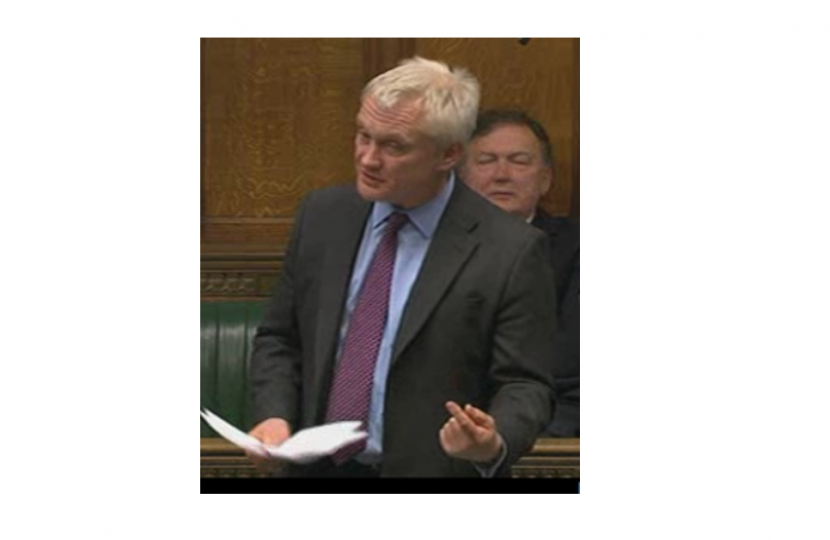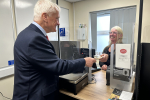
Last night in the House of Commons Graham Stuart, the Member of Parliament for Beverley and Holderness, led a compact half hour debate in which MPs from all sides of the House, but mostly from the Government benches themselves, urged the Government not to go ahead with imposition of VAT on static caravans.
It was another step in the cross-party campaign to ensure that the caravan tax does not go ahead. It follows the debate and vote last week during the Finance Bill on Graham’s amendment to rule out any caravan VAT changes.
East Yorkshire MPs united to oppose the tax and many MPs who had voted with the Government in the previous debate made clear that they did so only on the basis that the Government had promised to extend the consultation and reconsider the proposal.
Graham said, “Ministers were left in no doubt last night how widespread is the concern on the Government benches on this issue. We are delighted the Government has engaged so positively with the arguments and applaud their general approach. Be in no doubt, however, we will keep pressing the case and aiding ministerial understanding until such time as the policy is brought to an appropriate conclusion.”
He continued, “The Budget prioritised growth, jobs and investment and will be good for East Yorkshire. The caravan tax could undo that good work in our area, however, and that’s why we are all so united in calling for it to be dropped.”
Graham’s successful campaigns in the last Parliament included protecting community hospitals, defeating legislation on home education, stopping the incinerator at Saltend and saving the Beverley Pasture Masters. Since 2010 he has won the battle for lower Humber Bridge tolls and successfully persuaded the government to improve the A164 and build the Beverley Bypass.
FULL SPEECH AS DRAFTED TO FOLLOW:
Thank you, Mr. Deputy Speaker. East Yorkshire is at the heart of the caravan industry. In Beverley and Holderness I have a major manufacturer, ABI, in the centre of Beverley, suppliers to the manufacturers scattered around and parks dotted down the Holderness coast. For us, static holiday homes are a big deal.
The caravan industry is a British manufacturing success story and I wish we were here this evening celebrating its achievements and resilience, not considering tax policies that could seriously damage it.
Immediately after the budget local MPs and caravan manufacturers met in Beverley. What we heard was chilling. The industry employs thousands in the manufacturing side of things and tens of thousands in the parks. The government estimate of a 30% drop in demand could mean thousands of jobs lost and an industry struggling to recover from the credit crunch being knocked further backwards.
I’m delighted to say that the Chancellor agreed to meet with me and my Rt. Hon Friend representing Haltemprice and Howden, as well as other Members, to hear their concerns. He emphasised that the consultation was a genuine one, agreed to extend it, and committed to fully consider the arguments before a final decision was made.
The Treasury says that this measure corrects an anomaly. It says that a VAT exemption was not supposed to apply to static holiday caravans. The facts don’t bear this out.
The 1972 Finance Act brought in zero rating of certain caravans. The Notes on Clauses relating to the then Group 10 of Schedule 4 referred to relief for “houses and other domestic accommodation” and stated:
“The caravans in the Group are akin to houses; they are too large to be towed on the road, and are usually permanently attached to the land.”
The intention was to treat caravans, other than those towed by cars, as “other domestic accommodation” in the same way as houses.
It wasn’t just the notes to the Bill that carried this message. A government minister, Terence Higgins, the Financial Secretary to the Treasury made the Government’s intentions clear in March 1973. He said, “We have already distinguished between two kinds of caravan; the kind of caravan which is a home or a residence, and not normally the kind that one tows around—because even outside the West Country it would be too large to tow conveniently—and that which is not regarded as a home. Because of the general provision in legislation for relief from VAT for housing it was thought appropriate to include large caravans within the scope of relief.”
So the Government and Parliament had decided categorically and deliberately to exempt static holiday homes from VAT. Much later, in June 1989, another minister, the then Economic Secretary to the Treasury, Peter Lilley, said, “There is no question of withdrawing zero-rating from the purchase of static caravans. That relief is justified because the caravans can be, and often are, used as permanent homes and conventional homes are zero rated.”
And that’s the point. Statics are used like houses. They are used all the year round. They aren’t just for short breaks like mobile caravans. Imposing VAT on them is not logical and is not fair. Someone buying a £240,000 second home will pay 1% in stamp duty. 1%. Someone buying a £24,000 second home which is a caravan home will, if this proposal goes through, pay twenty times as much – 20% - for a building purchased and used in exactly the same way. It is unsupportable.
The caravan tax appeared in the Budget under the heading “correcting anomalies and closing loopholes”. Far from correcting one it will create one.
What will it mean in practice?
Aaron Cambridge and I both live in the same town of Beverley in East Yorkshire. He works at Willerby Holiday Homes, the country’s largest static caravan manufacturer based in the constituency of the Hon. Member for Hull East. Even without this increase in VAT he has been on a reduced work schedule of three and a half days a week for six months. When he contacted me he told me that he has worked in the caravan industry for 24 years and can never remember such hard times for the industry.
Laura Goldspink, who also works at Willerby Holiday Homes and lives in my constituency made it clear that, and I quote, “if this VAT implementation went ahead then all I can see is an end to the industry.”
Charles Gillett, who owns a business that is 100 percent reliant on the caravan industry, wrote to me and said the caravan sector is, “...an industry on a knife edge, struggling to emerge from the ravages of the recent recession. The HMRC’s predictions of impact are grossly underestimated, as in my opinion well over 2,000 businesses stand to be affected, not just 750.”
While the whole caravan industry and their supply chain would be affected by this proposed increase in VAT, East Yorkshire would be disproportionately disadvantaged. Peter Smith, the Chairman of the Swift Group, one of the leading employers in East Yorkshire, with 800 staff and a turnover of £200 million, explained it well saying, “A very conservative HMRC prediction is a reduction in demand of 30% which would lead to the lowest market figure for over a decade of around 11,000 units. Such a reduction is likely to increase the cost of materials (due to economies of scale), make credit harder to come by and jeopardise the viability of manufacturers and suppliers. The impact from this turmoil in the industry will be felt most heavily in East Yorkshire where there is already high unemployment and, in the short term, little prospect of redundant employees finding other work.”
I also want to point out that this tax rise would have a knock on effect with other industries and be especially difficult for young workers at a very difficult time. Guy Sparkes, who is the Director of Patrington Haven Leisure Park in my constituency – which has invested heavily over recent years -- tells me, “We currently have 34 employees with a majority being full time and with the new development we see this figure rising to 80, but with how VAT is going to effect the business we see the 34 reducing to 25 and the 80 reducing to 60. We also see the termination of contracts with at least four of our younger members of staff that are currently on apprenticeship schemes.”
He went on to say, “Following discussions with local business owners it is believed that without the current volume of holiday home owners and visitors that are attracted to the area because of our holiday park the village would suffer significantly and many believe their businesses would be unsustainable. Also they have pointed out that young trainee members of their staff would probably have their employment terminated because without the business that the leisure park gives them they would find training young staff for future years unaffordable.”
If you consider the impact of potential job losses you do have to wonder if this increase in VAT will actually raise any revenue at all. I would be interested, Mr. Deputy Speaker, if the Minister could address the issue of what analysis has been made of the revenue raised once you consider lost income from corporation tax, National Insurance, and the additional cost of paying job seekers allowance as a result of this change.
I am also concerned that this increase in VAT will hit rural and coastal communities the hardest. Most caravan parks are located in these areas and are critical to their local economies.
Following these arguments, Mr Deputy Speaker, you can see why so many members on these benches are determined to persuade the Treasury to drop the caravan tax. We understand that the Government is quite properly examining every way of bringing the appalling deficit left by Labour under control. We are convinced, however, that when the proposal is fully examined, our Rt. Honourable friend the Chancellor will conclude, as we have, that the caravan tax would be a terrible mistake.

